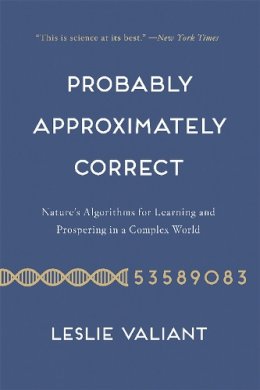
Stock image for illustration purposes only - book cover, edition or condition may vary.
Probably Approximately Correct: Nature's Algorithms for Learning and Prospering in a Complex World
Leslie Valiant
€ 25.88
FREE Delivery in Ireland
Description for Probably Approximately Correct: Nature's Algorithms for Learning and Prospering in a Complex World
Paperback. Num Pages: 208 pages. BIC Classification: PSAJ; UYQ. Category: (G) General (US: Trade). Dimension: 143 x 208 x 14. Weight in Grams: 212.
From a leading computer scientist, a unifying theory that will revolutionize our understanding of how life evolves and learns.How does life prosper in a complex and erratic world? While we know that nature follows patterns,such as the law of gravity,our everyday lives are beyond what known science can predict. We nevertheless muddle through even in the absence of theories of how to act. But how do we do it?In Probably Approximately Correct , computer scientist Leslie Valiant presents a masterful synthesis of learning and evolution to show how both individually and collectively we not only survive, but prosper in ... Read more
From a leading computer scientist, a unifying theory that will revolutionize our understanding of how life evolves and learns.How does life prosper in a complex and erratic world? While we know that nature follows patterns,such as the law of gravity,our everyday lives are beyond what known science can predict. We nevertheless muddle through even in the absence of theories of how to act. But how do we do it?In Probably Approximately Correct , computer scientist Leslie Valiant presents a masterful synthesis of learning and evolution to show how both individually and collectively we not only survive, but prosper in ... Read more
Product Details
Publisher
Basic Books
Format
Paperback
Publication date
2014
Condition
New
Weight
212g
Number of Pages
208
Place of Publication
, United States
ISBN
9780465060726
SKU
V9780465060726
Shipping Time
Usually ships in 4 to 8 working days
Ref
99-5
About Leslie Valiant
Leslie Valiant is the T. Jefferson Coolidge Professor of Computer Science and Applied Mathematics at Harvard University. He is a Fellow of the Royal Society and a member of the National Academy of Sciences. He is a winner of the Nevanlinna Prize from the International Mathematical Union, and the Turing Award, known as the Nobel of computing.
Reviews for Probably Approximately Correct: Nature's Algorithms for Learning and Prospering in a Complex World
